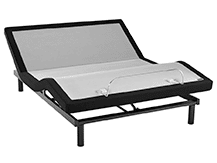
Millions of people deal with sleeping issues that negatively impact their lives, jobs, and those around them. Sleep apnea, insomnia, narcolepsy, and restless legs syndrome are common sleeping disorders that require special attention and even treatment.
For many, though, sleeping issues are undiagnosed and overlooked pains that bleed into all other areas of life. Sleeping for seven hours or more at a time is an attainable goal that starts with developing productive daily and nightly habits.
To develop a healthy sleep pattern, it helps to understand the sleep cycle. There are four main phases of sleep:
As stage 4 ends, the person begins to wake. You must go through each phase of the sleep cycle for vital brain function and body recovery.

While some sleeping concerns may stem from a disorder that requires professional attention, a few lifestyle changes will address most issues.
It is possible to become a healthy sleeper by practicing positive habits during the day and night. Supplement these habits with a healthy sleep environment as well. Creating a cozy space is as easy as adding soothing smells, sounds, and lights to a room and investing in good bedding.
A healthy lifestyle, positive sleeping habits, and a soothing bedtime environment are critical aspects of a good night’s rest. The missing piece may be, though, the right mattress. The right mattress will be supportive, comfortable, and affordable, allowing the sleeper to fall in place each night comfortably. A mattress that doesn’t suit the sleeper’s features, like body weight, sleeping positions, and temperature preferences, can ruin the chance of consistent sleep.
Mattress World Northwest partners with all our clients to find a bed that suits their needs. Visit showroom locations to test a mattress in person and gauge which fits you best. Our professional team will help guide you through the search process and be sure your bed promotes restful sleep each night.
What we do during waking hours directly impacts how we function during sleeping hours. Good habits can begin as soon as we wake up and continue until we wind down before bedtime.
The smell and warmth of a freshly brewed cup of coffee is an easy way to spring us out of bed in the morning. It isn’t the only option, though! Try these other methods to begin the day feeling alert and ready.

Try letting sunlight into the bedroom in the morning. If that isn’t an option, consider a wake-up light. When the light comes on, it brightens slowly, mimicking a sunrise.
Temperature is another primary influence on the circadian rhythm, especially extreme heat or cold. The brain releases adrenaline and other chemicals that encourage alertness and movement. The heart quickly responds to exposure to these temperatures and begins pumping blood through the body. The best way to achieve this stimulation is by submerging the body in water. Hop in a hot or cold shower, even for 30 seconds, and quickly lose those feelings of grogginess. Stepping outside also helps, depending on the time of year and outside temperature.
Food is another critical stimulator; eating tells the brain to break food into energy, igniting the mind and body. A nutritious breakfast also provides the body’s essential vitamins and proteins throughout the day. Even a tiny amount, like an egg or cup of berries, will help the brain and body stay energized, focused, and on track.

Sleeping habits are not only important right before and right after bedtime. We can do many things during the day to promote quality sleep at night.
Exercise offers numerous mental and physical health benefits, and getting at least 30 minutes of movement or activity every day is recommended. Exercise helps activate the brain as it releases endorphins. It also raises your core body temperature, creating a similar effect to a hot shower. Staying awake and alert longer during the day helps the brain and body be ready for sleep at night. The energy burned through exercise also helps prepare the body for a recharge.
Taking short rests during the day can be a great way to prepare for a long sleep, but it is crucial to nap mindfully. Keep naps short, only 20 to 30 minutes, and rest in the late morning or early afternoon. Try to avoid taking a nap within 8 hours of bedtime.
Caffeine is also a great way to prepare for a restful night when consumed responsibly. A cup of coffee, tea, or other caffeinated treat can help the brain wake up when it is drowsy. Most people drink caffeine in the morning and enjoy the occasional afternoon sip. Drinking caffeine too late in the day can be problematic, though. Avoid caffeine after 1:00 p.m. to 2:00 p.m.
Be wary of hidden caffeine too! Foods, candies, and even some medications have caffeine. To avoid trouble sleeping at night, check for caffeine on labels before consuming anything.
It is a widespread misconception that alcohol promotes a good night’s sleep. While alcohol can help a person wind down and fall asleep, the opposite effect happens just a few hours after the last glass.
Alcohol is a depressant that causes the brain, heart rate, and even breathing to slow down. It leaves a person feeling relaxed or sleepy and dips into the sleep phase faster. The effects of alcohol are felt as long as it is in their bloodstream, which typically only lasts a few hours until the liver metabolizes it. As it leaves the bloodstream, the heart rate speeds back up, disrupting the sleep cycle. The individual does not go through the natural sleep patterns, creating an imbalance in their sleep quality.
The effects of alcohol differ from person to person, but even a tiny amount can harm sleep. Avoiding it near bedtime and finding other ways to wind down is best.
Nicotine similarly affects the brain and body. Nicotine, found in tobacco products like vapes, cigarettes, cigars, or chewing tobacco quickly enters the bloodstream and reaches the brain. It boosts dopamine levels within seconds, giving a short-lived ‘feel-good’ high. Repeating this process can permanently impact how the brain releases chemicals, and it becomes an addiction.
In addition to other adverse health problems stemming from nicotine, this ‘feel-good’ high can disrupt brain channels and stop it from releasing the relaxing chemicals necessary for sleep. Try avoiding nicotine altogether, but especially before bedtime.
Digesting food takes time and energy from the brain and body and can cause acid reflux issues or stomach cramps. Going to bed hungry also can strain the brain and body. The best approach to the day’s last meal is to eat a few hours before bedtime. Whether you have a full dinner or just a light snack, try to nourish your body in that three-hour time window.

Another way to honor the body’s circadian rhythm is to set a bedtime schedule and stick to it. Going to sleep at the same time each night, then waking up consistently in the morning is a great way to prepare the mind and body for sleep. As this set time gets closer, dim the lighting, turn off electronics, and use cues like teas or smells to train your body to prepare for a night’s rest.
Sleeping affects several vital functions, including energy levels, immunity, healing, and brain power. Contact us or visit our website to see how the right mattress for you can aid in getting the best sleep possible.
« Living with Good Sleep Hygiene | Improving Bedtime Routines »
While you can't go wrong with any of our mattresses, here are a few factors you'll want to consider before making a purchase: your sleep position (and if you have a partner, theirs as well), the size of the space, and a price point. If you have any questions, rest easy knowing that our team is happy to help you find that perfect fit.
| Size | Dimensions |
|---|---|
| Twin | 38″ wide x 75″ long x 9.25″ tall |
| Twin XL | 38″ wide x 80″ long x 9.25″ tall |
| Full | 54″ wide x 75″ long x 9.25″ tall |
| Queen | 60″ wide x 80″ long x 9.25″ tall |
| King | 76″ wide x 80″ long x 9.25″ tall |
| Cal King | 72″ wide x 84″ long x 9.25″ tall |
| Split King (2pk) | 38″ wide x 80″ long x 9.25″ tall |
Mattress World Northwest makes it easy to choose the right foundation for your space and lifestyle.



Reliable support for your boxspring and mattress.
